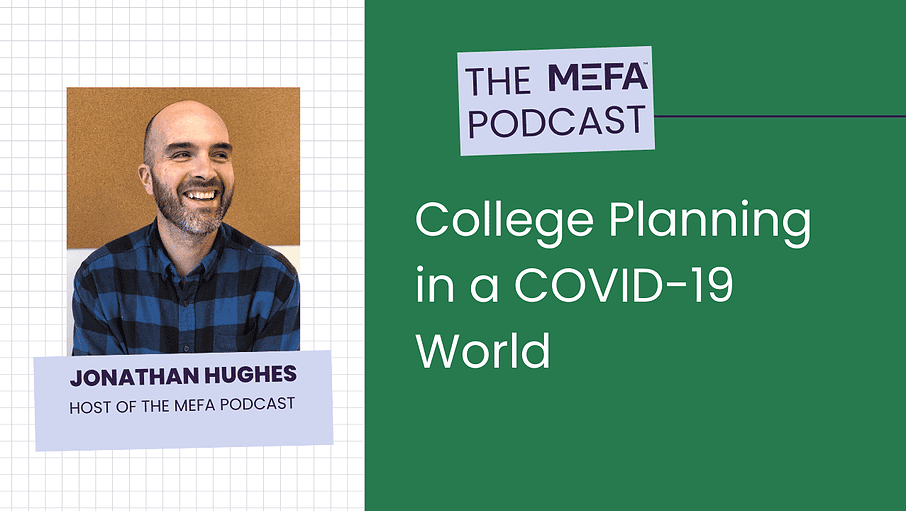

Resources Mentioned in this Episode
Jonathan Sparling: Everyone and welcome to navigating the course to college. A podcast by MEFA, this is our inaugural show, excited to kick off this show, uh, and, um, kind of bring some, some good information to all of you. For those of you not familiar with MEFA, MEFA stands for the Massachusetts educational financing authority.
We are a nonprofit organization located in Massachusetts. We work very closely with students and families throughout the Commonwealth, as well as nationally. And, um, our mission is to help families plan, save and pay for education. You know, this podcast is really going to talk about. All topics related to, um, to college and really all topics related to, uh, navigating that course.
Um, but certainly, uh, given the current situation, we will focus today’s show a lot on COVID-19. So my name is Jonathan Sparling, and I will be one of your cohosts. Uh, I’ve been in this field for a little over 10 years now and a variety of jobs at MEFA for almost two years. Um, and so excited to be talking with you today, kick it over to my other CO’s Jonathan.
Jonathan Hughes: So just to make it confusing to Jonathan. Yeah. Awesome. Jonathan. My name is Jonathan Hughes on the associate director of college planning and education at MEFA. And I’ve been in college financing for about 20 years. Actually, all of that time at MEFA, I’ve been, uh, the holder of, any number of titles, which wouldn’t interest you very much, except that the common denominator, um, that I have about 20 years of experience dealing with these questions that come up from parents, from students, um, dealing with colleges and, and really sort of explaining this process and all, all facets and learning about it as well. Normally I would be out, I think I had about a dozen events scheduled for March. Um, which had to be canceled of course, because of the COVID-19 outbreak.
And one of the reasons that we’re talking about this now is that it’s really, you know, would be strange not to talk about it because it is impacting everybody to break that down a little bit. What we’re going to be talking about today, we’re going to start off by talking about colleges, then we’ll talk about what MEFA is doing in the face for this crisis. And, and, you know, really talking about the questions that we are getting, we’ll talk about how this is affecting loan borrowers, and you probably saw a lot on the news about all that was done on the federal level to help people who are paying student loans, who might have lost a job or, or facing some economic stress or uncertainties.
And we’ll talk about that. And then we’ll finally say a word or two about savings near the end. So. So to start this conversation, I think what, um, is sort of on a lot of people’s minds and I’ll, I’ll ask Jonathan, what are you hearing about how colleges may adapt to this?
Jonathan Sparling: Certainly much like a lot of industries, the, uh, the higher education industry has, um, responded, uh, relatively quickly in terms of, um, some, some major changes to normal processes. Uh, both for current students. Uh, as well as prospective students. So, you know, some of the major things that we’re hearing and that we’re seeing of current students is that they are, um, a lot of them are at home.
Um, a lot are doing, uh, classes remotely. Um, we heard from a lot of colleges that are planning to, um, stay remote for the rest of the spring semester, you know, through beginning of May, middle of May is when many colleges are out. Um, but even into the summer. And so for students that were looking to take summer classes, a lot of colleges I’ve spoken to are planning to be remote through the summer.
Some are planning to do, you know, their entire summer semesters, remotely, you know. If they have one or two sessions, they’re going to do them all remote. Some are saying, okay, we’re just going to do the first one remote and then see what happens for the second one. Um, so they are planning long term and, uh, you know, with that beyond summer as well.
So, um, And it starts to impact students who are looking to enroll in the fall. So we’ve heard from colleges that, you know, they’re, they’re kind of taking this holistic approach and, and planning for the multiple scenarios. Um, and so many are. Putting contingency plans in place to say, if we need to stay remote into the fall 2020 semester, could we do it?
And how would we do it? And what would that look like? Would we continue to just operate as a remote function? You know, have classes remote, not have students come to campus and deliver classes that way. Um, we’ve heard that some colleges are thinking about essentially pushing the start of the fall semester into the spring, basically just pushing that, not starting in the fall and pushing that fall 2020 semester into January, 2021. And so, you know, that only works in some scenarios of a lot of logistics to figure out in terms of housing, in terms of class schedules, in terms of even accommodating that.
So that’s kind of floated on the table as well. We’ve also heard from some other colleges that are, um, and some colleges do this already, but a lot of colleges operate in a traditional two semester format. Some are exploring ways to basically split the fall semester into two. And so the first seven weeks you would take two classes and that the second seven weeks you would take another two classes. The idea being that if the COVID-19, um, response still requires us to be remote. Uh, maybe it would only require the colleges to be remote for the first seven weeks. And so delivery of the courses for the first seven weeks remote, and then maybe by mid October, November. Um, that’d be back on campus. So essentially shortening the semester into a, um, a quarter system and just focusing on two classes instead of a traditional four or five.
So in addition to knowing about potentially having a remote. Semester in the fall colleges, many colleges are pushing up or pushing back their deposit deadline. So traditionally May 1st would be the deadline. Um, some are, have pushed to June 1st or even later. And, um,
Yeah. Yeah. So, some are, you know, we’ve heard mostly if it’s May 1st, now it’s going to June 1st because you know, a lot of logistical things just kind of understanding who was the class and how many people are planning to come. Um, but we are, are hearing that as well. So, you know, just a lot happening from the college standpoint.
Jonathan Hughes: And just a question of, are you getting a sense of when these decisions might be made from the councils, when would they be communicating to families? If their kids are starting school in September or in January, do you have any sense of that?
Jonathan Sparling: So, because it’s such a fluid situation, you know, I think that college was cautiously optimistic that they will be able to get back. It’s campus on us in the fall. You know, a few schools that I’ve spoken to are looking at kind of an early and mid June as a, we need to make a decision about the fall. And, you know, with the summer as well, uh, and you know, June and July for a lot of campuses, that’s when they’re doing open houses or orientations. Uh, and so, you know, those are, are looking to be moved virtually as well.
Jonathan Hughes: That was going to, I was just about to ask you about that, about orientation. Yeah. So it seems like that, that, that is on the table to be virtual, it seems like in most cases. Yeah. Yeah. One of the things, since we all started working remotely, which we were all very curious to see what kind of calls would we be getting from customers and from borrowers.
I think we were thinking that we would be sort of swarmed with calls from people worried about their change, but, um, I think it sort of surprised all of us that the majority of the calls that we received, um, were really what we would have received in quote unquote, normal years. Right. So a lot of calls of, from families who have financial aid award letters from colleges, and they’re trying to figure out how they going to pay for college next year.
Right? Um, I think there’s sort of a good reminder that, um, as atypical as this all is that, you know, college will start next year. Um, kids are gonna graduate from high school and this life is going to go on and people really are proceeding the best that they can. And that that’s what they should be doing.
This is the time of year when we would be having our After the college acceptance seminars, we are still offering those virtually, you can see them for more on that topic. And people I think have made that shift pretty quickly to, to attend webinars versus in person seminars. I know that I’ve had a lot of people attend my after the college acceptance, uh, webinars. So, um, just to let everybody know that you can go to mefa.org and look at a webinar and see when the next point is where we’ve got a few of them and on the horizon. Um, and we also do, this is the time of year where we would offer one on one consultations to families.
So we’re offering that as well. They can sign up online and we can do sort of virtual counseling one-on-one over the computer. Uh, we can. Talk to them on the phone, we have essentially a bench of guidance, experts that are just as available to help them now, as we would be in any other year. So we, as a company are offering all the same services that we would offer in normal years to families.
Just the method is a little bit differently.
Jonathan Sparling: It seems like it moves pretty quickly on the college front to, to make that virtual and to reach out to, um, just students, both current students and prospective students. My former institution, the, the, the college that I graduated from, they reached out, um, to alumni it’s put together like personal testimonials and stories that they, you know, about their experience that they hope to, you know, utilize it as reaching out to students.
Jonathan Hughes: And that, that actually ties into. As you were saying, the 11th graders, right? So the folks who need to figure out how they’re going to pay for college, just like they would in any other year are the parents of seniors. Um, if, if you’re a parent of a high school junior or possibly even a sophomore, um, you know, you’re in an earlier point in this process, so you’re starting to look in colleges, you’re starting to do your college searches.
A big part of that. And we always talk about in our admissions seminars, uh, is the college visits. Right. And whenever I talk about, um, you know, I, I it’s got almost. It’s got almost a mythical property to it, like step on campus and they know right away whether or not they’re comfortable with this school.
And, you know, you talk about how important that is to go and actually visit a campus that you’re interested in. Um, and, and that’s, you know, unfortunately, one thing that students are not able to do right now. And so colleges are using that, um, that work or that virtual work around, they’re reaching out to alumni, uh, to give testimonials or to be available to prospective students or anyone who has questions for the virtual tours.
Um, a lot of colleges are offering virtual tours. Now, as far as 11th graders is a concern too. There are things that they can do now while they’re home. They can start their college search the same way they would probably otherwise, which is online searching.
And they can go to MEFA Pathway. So to start looking at colleges that they may be interested in saving those searches. There’s also a lot of federal tools like college scorecard and college navigator that they can use. Um, one thing that they can definitely do is to work. On the essay, um, that’s something that you can do. The common app has the seven or so essay prompts. One other thing I would say too, is not really knowing at this point at the time of recording, whether or not students are going to go back. We recommend that juniors ask for letters of recommendation by the end of their junior year, uh, so that their teachers can have the summer to work on them.
Um, so you might want, one of your teachers or one or two of your teachers too, to ask about possibly writing a letter of recommendation. You can still search for scholarships, right? So those scholarships contact the guidance office, which you should still be able to, to do a national scholarship there’s search engines.
So MEFA Pathway is a great resource for that. And you can sort of follow us on social media. We’re always sort of blasting out scholarships. Um, another thing I would say too, and this is important, especially if you have some colleges in mind that you want to apply to, you know, keep in touch with the college.
I would say that for a 12th grader as well, who hasn’t heard or has perhaps been wait-listed and you want to attend this college, um, colleges do keep track, um, all of the contacts that they get from students, because they want to gauge that student’s interest, keep up that communication. This isn’t necessarily a pause in this process. People are definitely still working. I think it’s easy to, to sort of get in the mentality that everything is kind of on pause. You know, things are still the proceeding. Um, so, so take advantage of that in the best way that you can. Um, I do want to move on briefly to, uh, borrowers. So I don’t know if you could talk about maybe some of the questions about that and, and federal loans versus private loans?
Jonathan Sparling: Yeah. So the, the kind of the, the, the good news is, is that, um, there was, uh, you know, legislation that was passed that moved, um, Pretty quickly, uh, through the, um, the federal government to provide some relief to a lot of folks impacted by COVID-19. And one of those groups was, um, federal student loan borrowers.
So, um, this was, uh, the biggest development was part of the cares act. But what the cares act did was for any student that has borrowed federal student loans, um, has borrowed loans or in repayment on federal student loans, it set the interest rate on those federal student loans. The 0% beginning on March 13th, 2020, and will go through September 30th, 2020.
The interest rate will be set at zero and students will not be required to make any payments. So when we, when we talk about federal student loans, the, the two major ones that, um, most students will have are, um, direct loans, which would be sometimes referred to as Stafford loans as well as Perkins loans.
Um, so those are kind of the two major loans that, um, kind of fall into this 0% interest and no payments required from March 13th to September 30th, 2020. And if you are in repayment, you may have noticed this. So, um, you know, my servicer, when I log into my account, um, for my federal student loans, my servicer, who’s the organization that you pay, there’s a big message plastered right there.
I have a automatic withdrawal setup and that stops. And so, you know, servicer is, again, moves, moves pretty quickly to implement this law that was passed on March 27th, but was retroactive to March 13th. Now, certainly if you want to make payments, you can, if you do make payments on those federal student loans during the time since interest is not accruing, uh, any payments that you make will go 100% towards principal.
Jonathan Hughes: Now I should say then, because I made a point of emphasizing what you said. Your servicer stopped your automatic draft. That’s not going to be the case for everybody necessarily. Right. So I think now is a good time to talk about the difference between, uh, federal student loans and private student loans as well. So I don’t know if you could speak to that.
Jonathan Sparling: So federal student loans kind of fell into this under this cares act legislation. So that, um, is, is what’s happening with federal loans, private student loans and private student lenders have, um, the authority to basically make their own decisions about what they are going to offer the Bowers and each company or each lender is okay offering their own, um, Agreed upon, um, type of relief.
And so, you know, just to give you an example, so MEFA, uh, we do have a private student loan. Uh, we call it a family loan because it’s, you know, the student and the co-borrower are both on the promissory note. And so for families who were struggling to make repayment, we do have a, um, option for a three month forbearance on your student loans where you will not be required to make any payments. Um, and then we also have modified payment terms that you could go into after that. Um, so, so that’s just, again, we’re one private lender. Each private lender is going to have their own response to this. So, you know, if you have, if you’re a borrower has private and federal, check your federal just to make sure that you got it. Put into the right, you know, 0% interest rate and your payments are not required and that should have happened automatically. Uh, but if you did borrow a private loan, we encourage you to check with your, um, with your lender on, on their particular situation in response.
Jonathan Hughes: Yeah. And for me for, um, to be, to get the forbearance, who would need to go and request that, it’s very easy to do that. Provide documentation or anything like that, from what I understand, you can actually just call up and request it through the, the, the phone line. Um, but it’s not, it’s not going to automatically. People would need to request it.
I just want it to end really quickly by talking very briefly about, uh, the last thing that we do that we haven’t talked about yet, which is savings. And I know it’s a tricky time to talk about savings because there are a lot of people who are feeling a lot of economic stress, maybe the loss of job, maybe there’s just a lot of anxiety and uncertainty out there.
And certainly with the market. There’s been a lot of market volatility, but I just, you know, I, I do want to talk about the importance of saving because the fundamentals of the situation have not really changed. Uh, savings is a really important part of paying a college bill. And, and even if it’s not a lot of money, having something where the child knows that, that, there were savings put aside for him or her. Uh, the child is more likely to attend and to graduate college. So it’s a powerful motivator for children. Um, so, you know, bearing in mind the fact that everybody’s in a more precarious situation at least than they were a few months ago. And at most maybe there’s been a job loss, which is always a tragic consequence.
There are ways that you can save for college in particular that are not, like the U.Plan, which is a MEFA prepaid tuition program where your money’s not invested in the market, but is, um, invested in bonds that are backed by the Commonwealth. And they’re tied to the increase in tuition for participating colleges rather than the market, or there ways that are not called specific that are outside the market, or if you are in an investment program, they may offer, like the U.Fund does, an option that is maybe not as aggressively invested, but your, your principles are by the FTAC. So again, bearing in mind that this is a very stressful time for people and their finances. I’m just throwing it out there that if you are able to consider either starting saving or continuing to save, um, it does again, have all the same benefits.
Jonathan Sparling: Couldn’t agree more. I, you know, it is difficult. It can be tough as you mentioned, but, um, as you said earlier. We are confident that the doors will open in the fall psychologist, whether that’s literally opening. They’re going to be open and, uh, you know, and, and that’s going to be the case moving forward. So certainly, uh, you know, if you can save, um, know, try to do it.
Jonathan Hughes: Yeah, I think that’s all great information. And, um, hopefully the next time that we all get together to talk, uh, on the MEFA podcast, we’ll have some answers to these questions that are yet to be determined now. And, and we’ll be discussing maybe the upcoming fall semester and everyone ready to go to school. So that’s all I have. Thanks for listening everyone.












